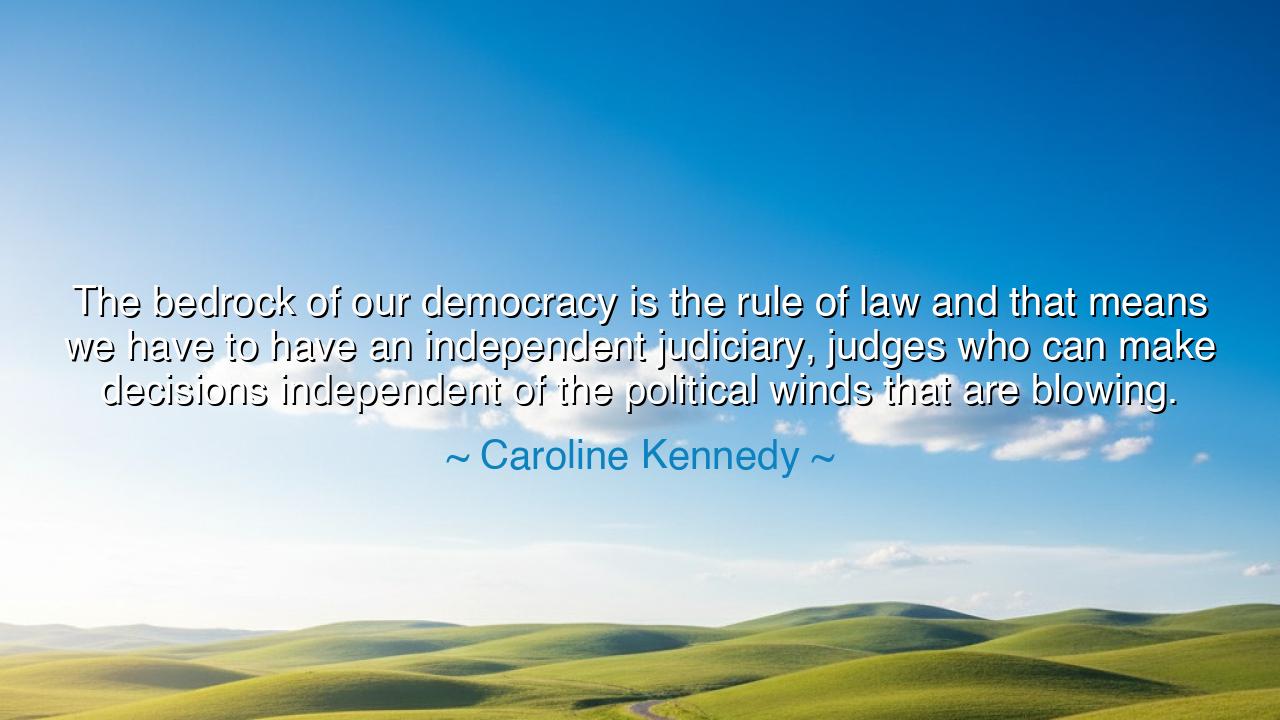
The bedrock of our democracy is the rule of law and that means we
The bedrock of our democracy is the rule of law and that means we have to have an independent judiciary, judges who can make decisions independent of the political winds that are blowing.






Listen well, O children of the future, to the words of Caroline Kennedy, whose wisdom speaks to the very foundation of a free society: "The bedrock of our democracy is the rule of law and that means we have to have an independent judiciary, judges who can make decisions independent of the political winds that are blowing." These words resonate deeply because they call us back to the essential principles that hold a nation together—the principles of justice, fairness, and integrity. In these words, we are reminded that the rule of law is not just a concept, but the lifeblood of a democracy that seeks to honor the dignity and rights of all its people.
The rule of law, O children, is the idea that laws are applied equally to everyone, regardless of their station or power. In a true democracy, the law governs, not the whims of rulers or the shifting tides of political favor. This principle is the bedrock upon which societies can stand firm, for it ensures that the powerful cannot escape justice, and that the weak are not trampled underfoot. Kennedy points us to the independent judiciary as the guardian of this ideal. For it is the role of the judiciary to interpret the law fairly, without bending to the influence of passing political forces. An independent judiciary is not swayed by the clamor of the crowds, nor the ambitions of politicians, but stands as a bulwark against injustice.
Consider, O children, the example of Alexander Hamilton, one of the Founding Fathers, who envisioned an independent judiciary as one of the key pillars of the American Constitution. In The Federalist Papers, he argued that judges should not be beholden to the will of the people or the whims of elected officials. Rather, they should be free to make decisions based solely on the Constitution and the law. This was a radical idea in a time when many rulers saw the law as an instrument of their personal power. Hamilton’s belief in an independent judiciary ensured that, even in the face of political pressure, the courts could uphold the principles of justice that were enshrined in the nation’s founding document.
The struggle for an independent judiciary is not just a concept of the past. It has been a living, breathing force throughout history. Consider, O children, the case of Brown v. Board of Education in 1954, when the Supreme Court struck down the doctrine of "separate but equal" and mandated the desegregation of public schools. This monumental decision was not the product of political winds, but of a judiciary committed to the rule of law and the principle of equality. The judges who made this decision were not swayed by the politics of their time, which supported segregation, but instead adhered to the fundamental principles of justice that demanded equality for all. Brown v. Board is a reminder that an independent judiciary can make the hard decisions that reflect the highest ideals of a society, even when those decisions are unpopular or politically inconvenient.
The lesson here, O children, is profound: without an independent judiciary, the rule of law becomes a hollow promise, easily corrupted by the shifting tides of political power. An independent judiciary is the protector of justice in its purest form—judges who, unafraid of political retaliation, can make decisions that stand above the fray. They serve not the will of politicians, but the principles of law and the rights of the people. Their decisions may not always be popular, but they must always be just. Kennedy’s words remind us that democracy depends on this unwavering commitment to fairness, and that without it, no society can truly call itself just.
But O children, the challenge does not end with a strong judiciary alone. We, the people, must also support and protect the rule of law by upholding the values of fairness, transparency, and respect for the rights of all. We must ensure that our voices are heard, but that we do not trample on the rights of others in the pursuit of our own interests. A democracy thrives when its people work in harmony with the independent judiciary to ensure that justice prevails, and that the rule of law is honored in every decision, in every action, and in every law passed. We, too, must be vigilant and hold our judges and lawmakers accountable to the truths that our society is founded upon.
Therefore, O children, let us remember the wisdom of Caroline Kennedy, and the lessons of Hamilton and the Supreme Court. Let us work to build a society where justice is not a tool of political expediency, but a right that belongs to all. Let us protect the independent judiciary, for it is the pillar that holds up the rule of law, and without it, our freedoms, our dignity, and our rights would be fragile and fleeting. Just as the Founding Fathers envisioned, we must nurture and protect the rule of law and the independent judiciary so that justice and freedom may endure for all. Let it be the light that guides our path, the strength that upholds our rights, and the shield that guards our democracy.






AAdministratorAdministrator
Welcome, honored guests. Please leave a comment, we will respond soon